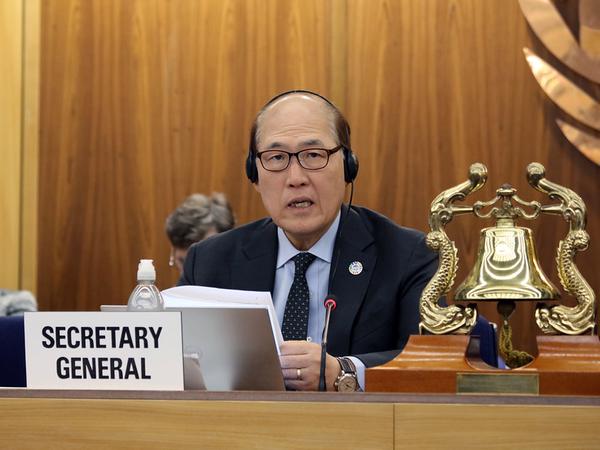Opposition to net-zero by 2050 ‘dwindling’ at the IMO
NGOs and shipping organisations are calling for International Maritime Organisation (IMO) member states to up their level of ambition at next year’s crucial greenhouse gas (GHG) emissions strategy meeting.
 PHOTO: IMO secretary-general Kitack Lim. IMO
PHOTO: IMO secretary-general Kitack Lim. IMO
The IMO's Marine Environment Protection Committee's (MEPC) 79th meeting drew to a close today with IMO secretary-general Kitack Lim saying “I note and welcome the progress made. It cannot be stressed enough how crucial it is that we keep the momentum and deliver an ambitious and fair, revised IMO greenhouse gas strategy at MEPC 80 next year.”
This week’s MEPC was before what is promised to be a vital meeting next summer. MEPC 80 is widely expected to hammer out a revised GHG strategy for shipping towards 2050.
The IMO’s current, initial strategy targets a 50% GHG reduction by 2050 – which has been described as wildly unambitious considering that many countries around the world have set net-zero GHG emission targets for the mid-century or sooner. Several household shipping company names have also set net-zero targets.
A revised IMO GHG strategy could see the level of ambition turned up several notches and also include more tangible interim targets for shipping companies to concentrate their decarbonisation efforts towards.
"The shipping industry urgently needs clear market and regulatory signals to reduce the investment risk currently surrounding alternative energy sources and technologies,” International Chamber of Shipping secretary general Guy Platten commented.
A group of environmental NGOs spearheaded by the Clean Shipping Coalition said that while MEPC 79 “failed to adopt a concrete shipping decarbonisation target for shipping this week, there was widespread support for eliminating the industry’s emissions by 2050 and for setting interim targets to achieve this goal.”
Ship emissions should be halved by 2030 and eliminated by 2040, the coalition says. It notes that opposition to a net-zero by 2050 target has “dwindled” since the previous MEPC 78 in June. 24 countries opposed it then, and just 10 countries this week when delegates convened in London this week.
“On the table at IMO are all the elements that are needed for a new climate strategy that would cut emissions deeply before 2030, put shipping on a pathway consistent with keeping global heating below 1.5 degrees, and help the world avoid the terrifying climate tipping points referred to by UN Secretary General Antonio Gutteres,” Clean Shipping Coalition president John Maggs said.
MedECA
Among the biggest highlights from this week’s instalment of the MEPC were that member states voted to cap the sulphur content of shipping emissions in the Mediterranean Sea to 0.1% from 1 May 2025. This means the Mediterranean will have the same sulphur limit as Emission Control Areas in North Sea, Baltic Sea, North America and the US Caribbean Sea, and it will most definitely lift LSMGO, and perhaps also ULSFO, demand in bunker ports in the region.
“Once again the UNEP/MAP-Barcelona Convention system demonstrates its vitality, this time by triggering a global commitment by IMO to reduce air pollution from ships,” said Tatjana Hema, who has been coordinating the efforts for the United Nations Environment Programme (UNEP).
By Erik Hoffmann
Please get in touch with comments or additional info to news@engine.online





